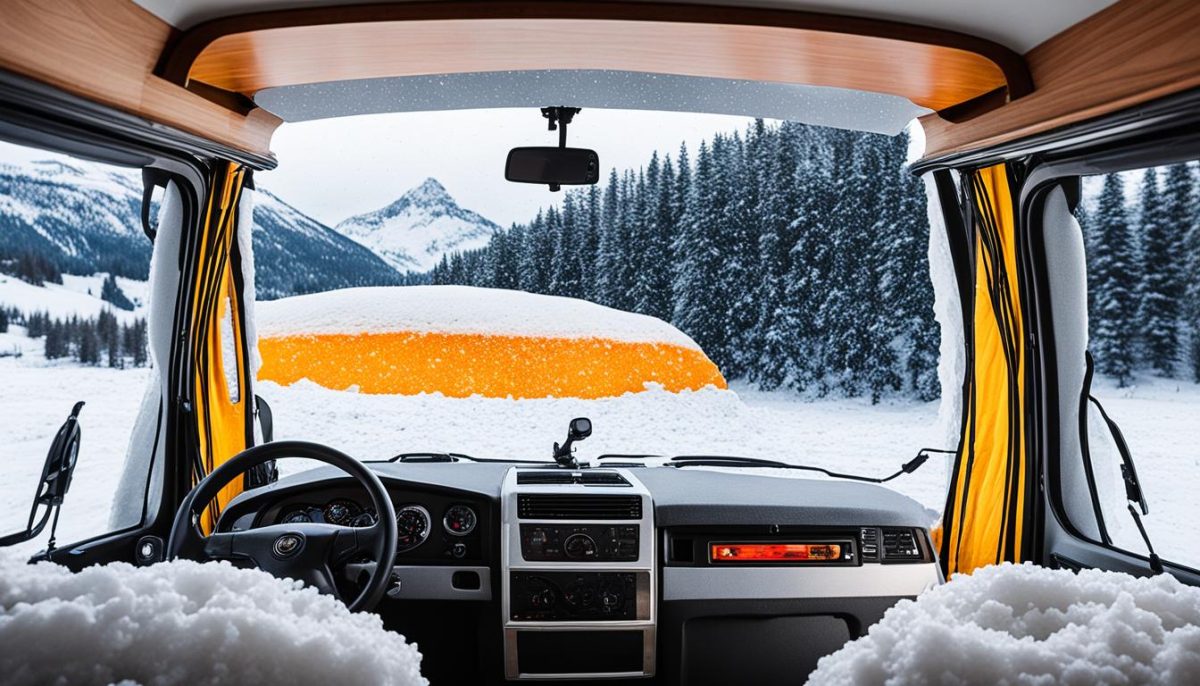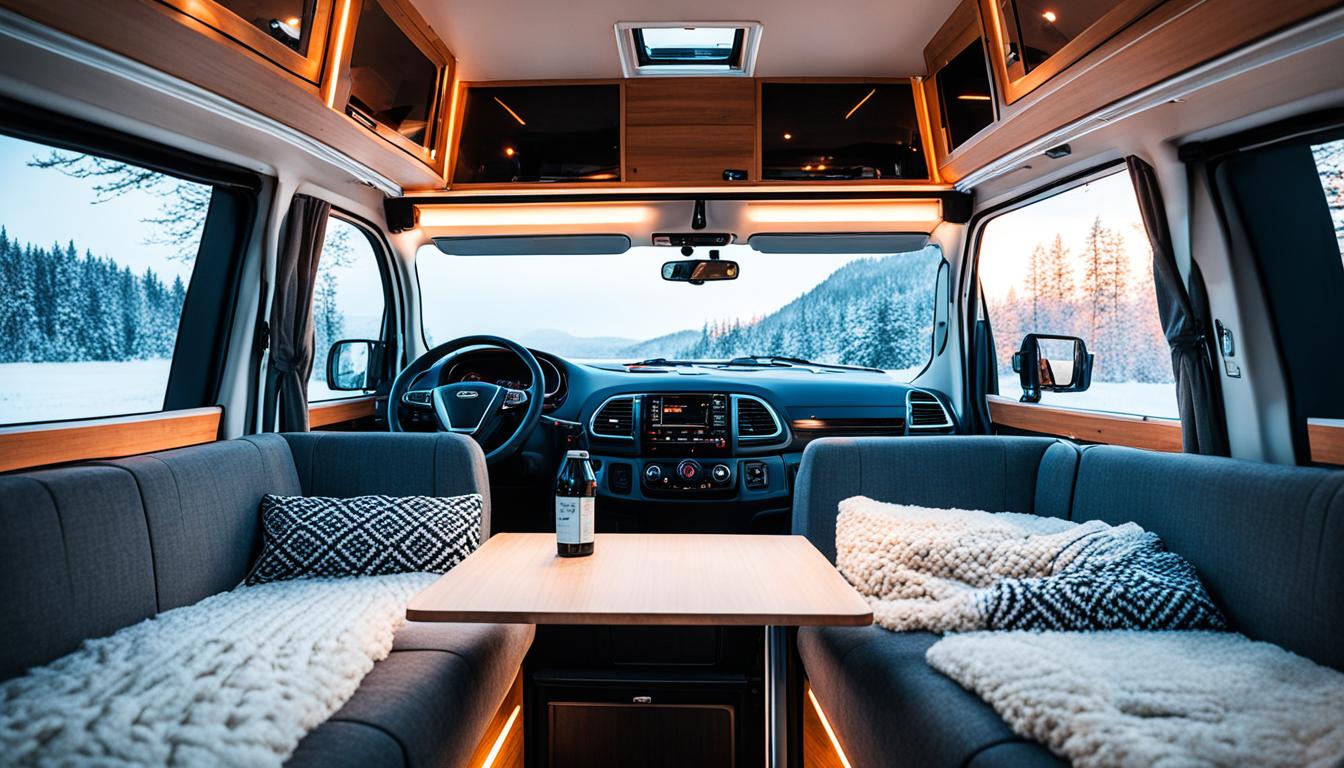Are you planning a cozy trip in your campervan but worried about staying warm during chilly nights? Don’t fret! We’ve got you covered with essential tips and tricks to keep you snug and comfortable throughout your adventures. From effective campervan heating methods to clever insulation techniques, we’ll help you create a cozy travel experience.
Winter camping doesn’t have to be a cold and uncomfortable affair. With our campervan heating tips, you’ll be able to stay warm no matter the weather. We’ll explore different heating systems, such as propane heaters and diesel heaters, and provide valuable insights to help you choose the right option for your needs, budget, and safety concerns.
But insulation is just as important as the heating system for staying cozy in a camper. In the following sections, we’ll delve into the world of campervan insulation. We’ll discuss the benefits of proper insulation and share insights on insulating materials that will help keep the cold air out and the warmth in. We’ll even introduce you to thermal curtains, a fantastic addition to enhance insulation and create a snug interior environment.
And that’s not all! We have more tricks up our sleeves to ensure you have the most comfortable campervan experience possible. Our additional tips, including clever clothing choices like layering techniques, will amp up your warmth during those chilly nights. Plus, we’ll reveal a secret tool for ultimate coziness: hot water bottles for campervans.
So, gear up and get ready for a warm and delightful campervan adventure! Let’s dive into the world of staying warm in a campervan and discover how you can make your trips cozy and memorable.
Insulating Your Campervan for Maximum Warmth
Proper insulation is essential for creating a warm and cozy environment in your campervan, especially when braving colder temperatures. By insulating your campervan effectively, you can keep the cold air out and the warmth in, ensuring a comfortable and enjoyable travel experience.
When it comes to campervan insulation, there are various materials and techniques to consider. Each option has its own advantages and can contribute to effective temperature regulation inside your vehicle.
- Fiberglass insulation: This popular choice offers excellent thermal resistance and is relatively easy to install. It provides effective insulation, preventing heat loss or gain and maintaining a comfortable temperature inside your campervan.
- Spray foam insulation: This type of insulation forms a tight seal and fills gaps, preventing air leaks and minimizing heat transfer. It provides excellent thermal insulation and helps to control moisture inside the campervan.
- Reflective foil insulation: Made from a layer of reflective material, this type of insulation reflects radiant heat and prevents it from entering or escaping your campervan. It works effectively in all climates and is easy to install.
In addition to using insulating materials, incorporating thermal curtains into your campervan can further enhance the insulation and create a cozy interior environment. Thermal curtains are designed to block out cold drafts and provide an additional layer of insulation for the windows. They help to maintain a comfortable temperature and offer privacy during your travels.
Benefits of Thermal Curtains for Campervans
Installing thermal curtains in your campervan not only helps to retain heat but also provides the following benefits:
- Energy efficiency: Thermal curtains help to reduce heat loss, resulting in lower energy consumption for heating the campervan.
- Noise reduction: The thick fabric of thermal curtains also acts as a sound barrier, reducing external noise and creating a quieter interior space.
- Privacy: Thermal curtains provide privacy, preventing prying eyes from peering into your campervan while you enjoy your travels.
- Customization: Thermal curtains come in a variety of colors, patterns, and sizes, allowing you to personalize your campervan’s interior while enhancing insulation.

In the next section, we will explore different heating systems available for campervans and help you choose the right one to keep you warm on your adventures.
Choosing the Right Heating System
When it comes to staying warm in your campervan, having a reliable heating system is crucial. In this section, we will explore the different heating options available for campervans and discuss the pros and cons of propane heaters and diesel heaters. By understanding the advantages and considerations of each type, you can make an informed decision that aligns with your needs and preferences.
Propane Heaters
Propane heaters are popular among campervan owners for their convenience and efficiency. These heaters run on propane gas, which is readily available at most campgrounds and outdoor stores. They offer instant heat and are often equipped with built-in safety features such as oxygen depletion sensors and tip-over switches.
“Propane heaters are a great choice for campers who prioritize ease of use and portability. They provide reliable warmth and are relatively affordable compared to other heating options.” – Sarah Johnson, experienced campervan enthusiast
However, it’s important to note that propane heaters require proper ventilation to ensure safe operation. They produce carbon monoxide, a potentially dangerous gas, so proper ventilation and regular inspections are essential. Additionally, propane heaters consume fuel quickly, which means you’ll need to have an adequate propane supply during your camping trips.
Diesel Heaters
Diesel heaters are another popular choice for campervans, especially for those who have built-in diesel fuel tanks. These heaters offer excellent heating performance and are highly efficient in fuel consumption. Diesel heaters operate quietly, ensuring a peaceful camping experience.
“Diesel heaters are a reliable and efficient option for campervan heating. They provide consistent warmth and are known for their longevity. Plus, the ability to utilize the existing diesel fuel tank in your campervan adds to their convenience.” – Mike Thompson, campervan enthusiast
Compared to propane heaters, diesel heaters require less frequent refueling, making them ideal for longer trips. However, installation can be more complex, especially if you don’t already have a diesel tank in your campervan. Proper maintenance and periodic servicing are also important to ensure optimal performance.
Choosing the Right Heating System
When choosing a heating system for your campervan, consider the following factors:
- Your camping preferences and destinations
- Budget and cost of installation
- Fuel availability and consumption
- Installation requirements and complexity
- Safety features
It’s crucial to select a heating system that meets your specific needs, provides sufficient warmth, and ensures safety during your camping adventures.
Comparison of Propane and Diesel Heaters
| Propane Heaters | Diesel Heaters | |
|---|---|---|
| Availability | Widely available | Requires existing diesel tank |
| Convenience | Portable and easy to use | Requires installation |
| Efficiency | Varies; consumes fuel quickly | Highly efficient fuel consumption |
| Installation | Simple | Can be complex |
| Safety | Requires proper ventilation | Safe operation; minimal risk |
Additional Tips for Staying Warm in Your Campervan
When embarking on a winter camping adventure in your campervan, it’s crucial to take extra measures to stay warm and comfortable. Here are some additional tips to enhance your warmth and ensure an enjoyable experience:
Firstly, consider layering your clothing for optimum insulation. Layering allows you to trap air between each garment, creating a barrier against the cold. Start with a moisture-wicking base layer to keep sweat away from your skin. Add a thermal layer to provide insulation, and finish with a waterproof and wind-resistant outer layer to protect against the elements. This layering technique will help you regulate your body temperature and adjust as needed throughout the day.
Another clever idea to stay cozy in your campervan is to use hot water bottles. These portable and affordable items can provide a comforting source of warmth during chilly nights. Simply fill them with hot water, seal them tightly, and place them in your sleeping bag or under the blankets. The gentle heat will keep you snug throughout the night, ensuring a restful sleep and a cozy start to your mornings.
Additionally, don’t forget to insulate your campervan windows with thermal curtains or covers. These not only add privacy but also act as a barrier against heat loss. Thermal curtains are designed to trap air and restrict the transfer of cold air from outside. By keeping your campervan’s interior insulated, you can significantly minimize the effect of the outside temperature, keeping you warm and comfortable inside.



